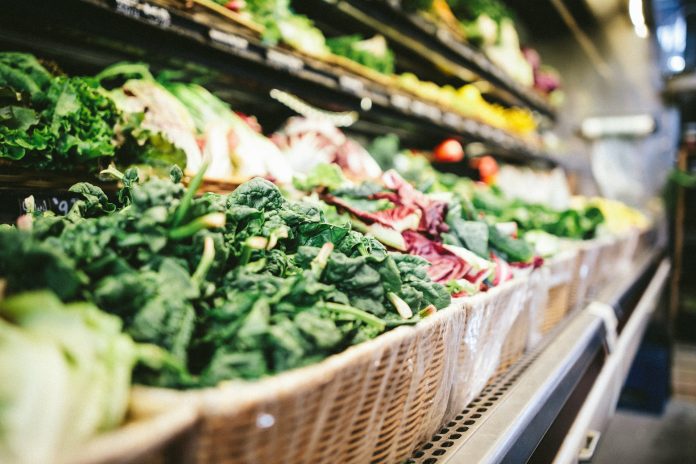Eating veggies and fruits in your daily meals? Well, consuming a diet enriched with fruits and vegetables may help you control the blood pressure level and reduce the probability of other health problems like stroke, heart disease, cancer, digestive issues. Such consumption has a positive impact on blood sugar that may further help you in monitoring your appetite as well.
Seung Hee Lee Kwan said that very less number of people consume the suggested amount of veggies and fruits each day which puts them at the verge of chronic health problems like heart disease and diabetes, consequently, the population is also losing essential minerals, fibers, and vitamins which they may get from vegetables and fruits.
A report from middle and low-income nations revealed that around 18% of the population meet the recommendations of WHO and intakes about 400 g of fruits and vegetables each day, which is somewhat equivalent to 5 servings per day.
USDA (U.S. Department of Agriculture) through its guidelines suggested that depending on gender, age, overall condition of health, and physical activity one should consume about 5-13 servings of vegetables and fruits each day. Vegetables and fruits in your daily diet obviate chronic health issues and may help you in feeling more energetic and healthier.
A 2019 online survey of the Indian population revealed that about 15.1 % consume fruits as morning snacks, 4.7 % in their lunch, 7.7% in breakfast, 13.4% as evening snacks, and 6.1% in their dinner.
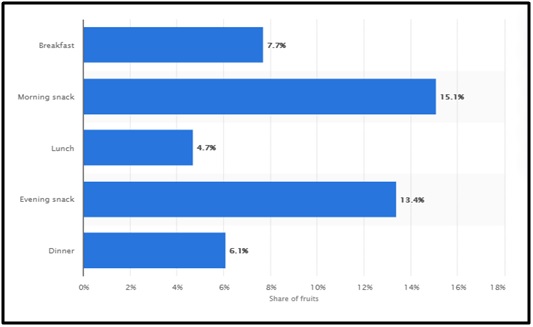
China produces about 554 million metric tons of vegetables which are accompanied by 127 million metric tons of India.
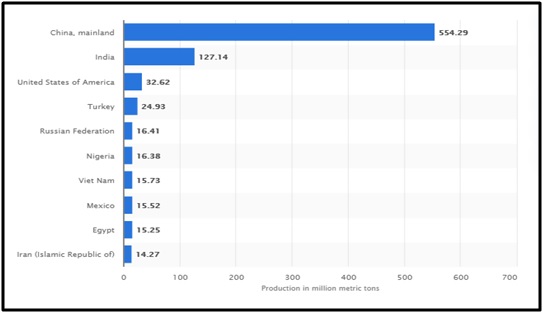
It was reported that the per capita fruit consumption in the U.S. developed into 276.1 pounds by 2018 (Statista, 2020). About 90 % of the U.S. population seeks the inclusion of fruit in their daily diet, apart from these 5.2% of school students do not consume fruits in their meals (Statista, 2020).
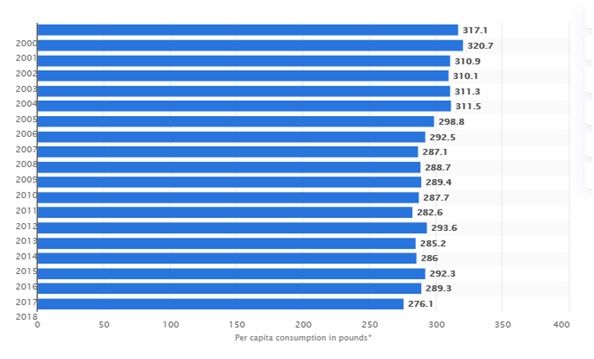
In general, one serving is equivalent to one-half cup of chopped or sliced vegetables or fruits. Yet, for greens such as lettuce and spinach, the serving amount is equivalent to one filled cup. One piece of fruits like orange or apple can be considered as a serving.
It was reported that about 21.6% of the Chinese population always consumes a healthy diet. Awareness about consuming healthy meals have turned into a trend among the Chinese (Statista, 2020).
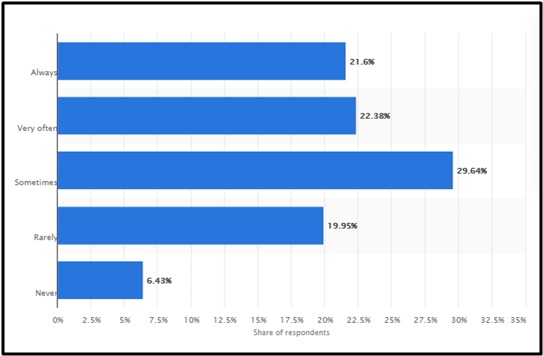
Arthur Agatston stated that a healthy diet is a part of a healthy lifestyle and it is significant to develop schedules that are realistic, worth living, and simple.
Challenges associated with the eating of vegetables and fruits include:
- Production costs dissuade the consumption of fresh veggies and fruits for common people. Sue Mah stated people often consider that veggies and fruits are expensive, yet one does not have to be.
- Lacking proper meal planning and knowledge often deter people in the inclusion of veggies and fruits in their daily diets. Sue Mah recommended that one should aim to consume at least two servings of veggies and fruits a day in their snacks and meals. She also said that some of the people don’t know the way of cooking or buying or preparing veggies and fruits dishes, and are suggested to go for online tutorials or videos.
- Time limitations often gyrate people apart from the preparation of fruits and veggies in meals. She stated that cutting and preparing veggies takes a lot of time which drives people away from consuming them. She also suggested chopping the veggies before the preparation of the meal.
- Some face trouble in finding fruits and veggies due to availability issues. She further stated that most of the stores have committed to selling only selected organic as well as regional specialty items.
- Improper storage of food led to its wastage. She said that improper veggies and fruit storage may lead to its wastage and deters the buying behavior of people.
Exclusion of veggies and fruits in your daily diet may make your body susceptible to insufficiencies and surfeit of disease. Scurvy, night blindness, digestive problems, metabolic disorder, hemorrhagic disease, cancer, etc, are mostly caused due to the lack of minerals, vitamins, fibers, and other nutritive pigments.
The following are some of the tips which may help you in adding more fruits and veggies in your daily diet.
- Selecting healthy snacks for making you tide over till the next meal, such snacks may include peanut butter and celery, hummus and baby carrots, etc.
- Leaving fruits at prominent places would help you in grabbing those when hungry while moving somewhere or working.
- Making soup could be a simple way of increasing the intake of veggies. You can simply add cooked leftover chewable vegetables into the soup.
- Plan for your future meals and prepare your fruits and veggies for the week which may also help you in saving time while cooking and would get you a healthier diet as well.
- Always ensure that your consumables are paired with veggies and fruits and avoid out stock of veggies or fruits.
- Make your servings double which would benefit you as USDA also suggests getting your plates half-filled with veggies and fruits.
- Every time includes salad at least once after or before your dinner. The inclusion of salad in your daily diet does not mean that it should be only tomato and lettuce, it can be sauteed mushroom or may also include nuts and fruits.
- Freeze up the fruits as sometimes you may consume it as a dessert which may comprise berries or grapes and ½ a cup of it is equivalent to a serving.
- Blending of smoothie with low-fat milk, fruits, and some amount of greens for boosting up the nutritional value of the item which may be served perfect for lunch, snack or breakfast.
Sneak in for adding spinach in the consumable of picky eaters and blend avocado and red peppers for adding flavor and benefits.





